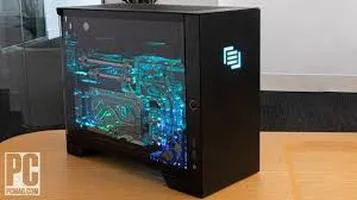High-Performance Computer Hardware for Gamers: A Comprehensive Review
High-performance computer hardware for gamers is designed to deliver exceptional speed, graphics, and responsiveness, providing an immersive gaming experience. At the core, powerful CPUs such as the AMD Ryzen 9 or Intel Core i9 ensure smooth multitasking and rapid processing. High-end GPUs like NVIDIA's RTX 30-series or AMD's Radeon RX 6000-series render stunning visuals with ray tracing and high frame rates. Fast SSDs with ample storage capacity reduce load times, while high-capacity RAM, often 16GB or more, supports seamless gameplay. Advanced cooling systems maintain optimal performance by preventing overheating during intense gaming sessions. These components are housed in customizable cases with RGB lighting, offering both aesthetic appeal and functionality to meet the demands of both casual and competitive gamers.

In the ever-evolving landscape of gaming, high-performance computer hardware is not just a luxury but a necessity for any serious gamer. The quest for the ultimate gaming experience demands components that can handle the intense graphics, rapid processing, and seamless multitasking modern games require. This review delves into the critical hardware components that define high-performance gaming PCs, evaluating their impact on gaming and offering insights into the best options available in the market today.
Graphics Processing Unit (GPU)
The cornerstone of any gaming rig is undoubtedly the Graphics Processing Unit (GPU). It’s responsible for rendering the intricate visuals and maintaining smooth frame rates essential for an immersive gaming experience. Leading the pack are NVIDIA and AMD, with their RTX and Radeon series, respectively. NVIDIA’s RTX 30 series, particularly the RTX 3080 and RTX 3090, set the bar high with their ray-tracing capabilities and impressive VRAM. Games like Cyberpunk 2077 and Red Dead Redemption 2 showcase their prowess, delivering breathtakingly realistic environments and fluid gameplay.
AMD’s Radeon RX 6000 series also deserves mention, offering robust performance with features like Smart Access Memory and FidelityFX Super Resolution. The RX 6800 XT, for instance, competes closely with NVIDIA’s offerings, providing a cost-effective alternative without compromising on performance. Ultimately, the choice between NVIDIA and AMD often boils down to personal preference and budget, but rest assured, both brands deliver top-tier gaming experiences.
Central Processing Unit (CPU)
While the GPU is crucial for rendering graphics, the Central Processing Unit (CPU) is the brain behind the operation. It handles the game logic, physics calculations, and general system operations. Intel and AMD dominate this space, with Intel’s Core i9-12900K and AMD’s Ryzen 9 5900X leading the charge. Intel’s latest Alder Lake CPUs, like the i9-12900K, bring a hybrid architecture that combines performance and efficiency cores, offering exceptional gaming performance and multitasking capabilities.
On the other hand, AMD’s Ryzen 9 5900X, with its 12 cores and 24 threads, excels in multi-threaded workloads and gaming alike. The Zen 3 architecture enhances instruction per cycle (IPC) performance, making it a formidable contender. Both CPUs are more than capable of handling the most demanding games and streaming simultaneously, ensuring minimal bottlenecks and maximizing frame rates.
Memory (RAM)
Random Access Memory (RAM) plays a pivotal role in ensuring smooth gameplay and quick load times. For high-performance gaming, 16GB of DDR4 RAM is often the sweet spot, providing ample headroom for most games and multitasking scenarios. However, for those looking to future-proof their systems or engage in more demanding tasks like video editing or running virtual machines, 32GB is a worthy investment.
Brands like Corsair, G.Skill, and Kingston offer high-quality RAM with speeds exceeding 3200MHz, which is beneficial for both gaming and general system responsiveness. The advent of DDR5 RAM is also on the horizon, promising even higher speeds and bandwidth, though it’s currently more of a luxury than a necessity for gamers.
Storage
Gone are the days when a traditional Hard Disk Drive (HDD) would suffice for a gaming PC. Solid State Drives (SSDs) have revolutionized storage with their blazing-fast read and write speeds, drastically reducing load times and improving overall system performance. A combination of a high-capacity HDD for bulk storage and an SSD for the operating system and frequently played games is an ideal setup.
NVMe SSDs, such as the Samsung 970 EVO or the Western Digital Black SN850, take performance a notch higher with even faster data transfer rates compared to SATA SSDs. Gamers will appreciate the quick boot times and rapid game loading, enhancing the overall gaming experience.
Cooling Solutions
High-performance components generate substantial heat, necessitating effective cooling solutions to maintain optimal performance and longevity. Air cooling, with brands like Noctua and Be Quiet!, offers reliable and relatively affordable options. High-end air coolers can handle substantial thermal loads while maintaining low noise levels.
For those seeking the ultimate in cooling performance, liquid cooling systems, such as those from Corsair and NZXT, provide superior heat dissipation. Closed-loop liquid coolers (AIOs) are user-friendly and offer excellent cooling performance without the complexity of custom loops. Proper cooling ensures that your CPU and GPU can perform at their peak without thermal throttling, especially during extended gaming sessions.
Power Supply Unit (PSU)
A high-performance gaming PC requires a robust and reliable Power Supply Unit (PSU) to ensure stable power delivery to all components. Brands like EVGA, Corsair, and Seasonic are renowned for their high-quality PSUs. An 80 Plus Gold or Platinum certified PSU is recommended for its efficiency and reliability. Wattage requirements will vary based on the specific components, but a capacity of 650W to 850W is typically adequate for most high-end gaming rigs.
Conclusion
In conclusion, building or upgrading a high-performance gaming PC involves careful consideration of each component. The GPU and CPU are the primary drivers of performance, while RAM, storage, cooling, and the PSU play crucial supporting roles. NVIDIA and AMD lead the GPU market with their cutting-edge technologies, while Intel and AMD offer exceptional CPUs for gaming and multitasking. High-speed RAM and SSDs ensure smooth and responsive gameplay, and effective cooling solutions keep temperatures in check. A reliable PSU provides the necessary power to keep everything running smoothly.
Investing in high-performance computer hardware is a true game-changer, transforming your gaming experience with stunning visuals, rapid load times, and seamless multitasking. Whether you’re a competitive eSports player or a casual gamer, the right hardware can elevate your gaming to new heights.






